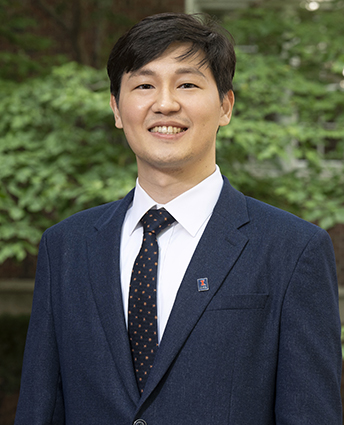Sep 24, 2024
Chung explores interconnectivity of gig economy platforms
David Chung said he’s drawn to teaching and researching business strategy because of its complex nature without one fixed answer.
“As an undergraduate, I was fascinated by the open-ended questions of strategy – but I’ve since learned it’s not as simple as that, and I enjoy working through that ambiguity with students,” said Chung, who joins Gies Business this fall as an assistant professor of business administration.

“I am passionate about teaching as I firmly believe it can have a large, cascading effect on society,” he said. “My students can take what they’ve learned and make an impact across many companies or become an entrepreneur and bring a new idea to life.”
One of his favorite ways to begin a strategy course is to show a typical business proposal from “Shark Tank” and ask students if they would invest in the company. He then revisits their answers at the end of the semester, asking them to apply frameworks and tools that they’ve learned to their decision.
“I have enjoyed working with students from diverse backgrounds who are full of questions.,” said Chung, who won teaching excellence awards at University of Michigan’s Ross School of Business, where he earned his PhD in strategy in 2024. “I am always surprised by the students' great ideas and diverse angles that I’ve never thought about before. Through a collective discussion, we are able to come up with creative strategies, and they can never be wrong because there is no perfectly right answer.”
Chung earned his bachelor’s degree in business administration and master’s degree in strategy and international business from Seoul National University in Korea. He said he was drawn to Gies Business because it is one of the few business schools that has an equally strong reputation in corporate strategy and technology innovation, which align perfectly with his research.
Chung’s research explores corporate and technology strategy in the platform economy. Unlike a traditional business model, platforms have to rely on gig economy participants to create value.
“Uber is basically the largest taxi company in the world without owning a single vehicle,” said Chung. “Instead, Uber relies on rideshare drivers and their vehicles to provide services.”
Chung noted that while this approach reduces costs, it also forces platforms to share their resources because gig workers can work on multiple platforms at once. For instance, rideshare drivers often work on both Uber and Lyft. Similarly, restaurants list themselves on both Uber Eats and DoorDash.
“This means that platforms are becoming more interdependent and interconnected,” said Chung, who added that this independence creates new growth dynamics.
For example, his research has revealed that when Uber decided to launch a food delivery platform, Uber Eats, it essentially incentivized drivers from both Uber and Lyft to join the food delivery business.
“So, Lyft partially paid the cost of Uber’s diversification,” said Chung, who also looked at the impact of Uber Eats' $2.7B acquisition of Postmates in 2020. “Instead of consolidating the market power of Uber Eats in the food delivery business, my research found that many restaurants on Postmates switched to DoorDash instead, creating a direct impact on a competing platform.”
Both Chung and his wife, assistant professor of accountancy Stacey Choy, were drawn to Gies because of its reputation as a top business school.
“When it was time to make our next move, we were looking for a vibrant Midwest culture and a business school that invested in junior faculty’s research pursuits,” said Chung, who added he was also drawn to the opportunity to collaborate with Gies faculty across disciplines as well as the College’s Illinois Strategic Organizations Initiative (ISOI).
“Platform business models are essentially about coordinating with others to create value,” said Chung. “I am excited about the interdisciplinary culture of Gies, and I hope the College can be my platform to collaborate with the amazing faculty here.”
